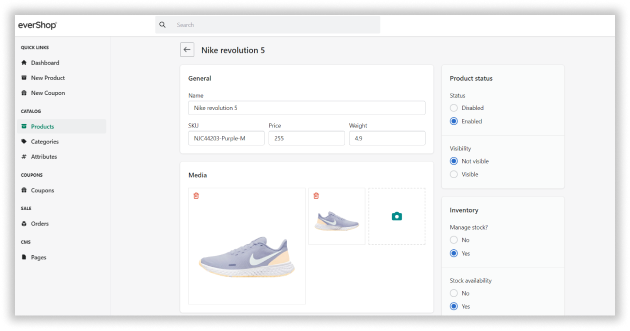System Requirements
Before installing EverShop, ensure your system meets the following requirements. This guide covers the necessary software, hardware, and environment specifications for optimal performance.

Overview
EverShop is a modern e-commerce platform built on Node.js and PostgreSQL. It requires specific system configurations to run efficiently and securely.
Operating System
EverShop is cross-platform compatible and can run on:
- Linux (Ubuntu 20.04 LTS or later, CentOS 8+, Debian 10+)
- macOS (10.15 Catalina or later)
- Windows (10 or later, Windows Server 2019+)
For production environments, we recommend using Linux-based systems (Ubuntu Server or CentOS) for better performance and stability.
Software Requirements
Node.js
Required Version: Node.js 20.x or higher
- Download from nodejs.org
- We recommend using the LTS (Long Term Support) version
- Verify installation:
node --version
Node.js versions below 20.x are not supported and may cause compatibility issues.
NPM (Node Package Manager)
Required Version: NPM 9.x or higher
- NPM is included with Node.js installation
- Verify installation:
npm --version - Update NPM if needed:
npm install -g npm@latest
PostgreSQL Database
Required Version: PostgreSQL 13 or higher
- Download from postgresql.org
- Recommended: PostgreSQL 15+ for improved performance
- Verify installation:
psql --version
Database Configuration Requirements:
- An empty PostgreSQL database for EverShop
- Database user with full privileges (CREATE, ALTER, DROP, INSERT, UPDATE, DELETE)
- UTF-8 character encoding
- Recommended extensions:
pg_trgmfor full-text search
During installation, EverShop will automatically create the necessary database schema and tables. Ensure your database user has sufficient privileges.
Hardware Requirements
Minimum Requirements
Suitable for development and testing environments:
- CPU: 2 cores
- RAM: 2 GB
- Storage: 10 GB available disk space
- Network: Stable internet connection for package installation
Recommended Requirements
For production environments and optimal performance:
- CPU: 4+ cores
- RAM: 4 GB or more
- Storage: 20 GB+ SSD storage
- Network: High-speed internet connection with low latency
For stores with high traffic or large product catalogs (10,000+ products), consider scaling up to 8 GB RAM and using SSD storage for better database performance.
Development Environment (Optional)
For developers working on EverShop customization or extension development:
Required Tools
- Git (version 2.x or higher) - for version control
- Code Editor - VS Code, Sublime Text, or similar
- Docker (optional) - for containerized development
Additional Dependencies
When running EverShop in development mode, you'll need:
{
"@types/node": "^20.x",
"typescript": "^5.x",
"@parcel/watcher": "^2.x",
"@types/config": "^3.x",
"@types/express": "^4.x",
"@types/pg": "^8.x",
"@types/react": "^18.x",
"execa": "^8.x"
}
These will be installed automatically when running npm install with the --save-dev flag.
Network and Security Requirements
Firewall Configuration
Ensure the following ports are accessible:
- Port 3000 - Default EverShop application port (configurable)
- Port 5432 - PostgreSQL database port (if remote database)
- Port 443 - HTTPS (for production with SSL)
- Port 80 - HTTP (redirects to HTTPS)
SSL/TLS Certificate
For production environments:
- Valid SSL/TLS certificate (Let's Encrypt, commercial CA, or similar)
- Configured reverse proxy (Nginx, Apache, or similar)
Browser Requirements
Admin Panel
The EverShop admin panel supports:
- Chrome/Edge (latest 2 versions)
- Firefox (latest 2 versions)
- Safari (latest 2 versions)
Storefront
The customer-facing store supports:
- Modern browsers with ES6+ support
- JavaScript enabled
- Cookies enabled
Docker Requirements (Optional)
If using Docker for deployment:
- Docker: 20.10 or higher
- Docker Compose: 2.0 or higher
- Sufficient resources allocated to Docker containers (2GB+ RAM)
Cloud Platform Compatibility
EverShop can be deployed on various cloud platforms:
- AWS (EC2, ECS, Elastic Beanstalk)
- Google Cloud Platform (Compute Engine, Cloud Run)
- Microsoft Azure (Virtual Machines, App Service)
- DigitalOcean (Droplets, App Platform)
- Heroku
- Railway
- Vercel (with serverless PostgreSQL)
Checking Your System
Before installing EverShop, verify your system meets the requirements:
Check Node.js Version
node --version
# Should output: v20.x.x or higher
Check NPM Version
npm --version
# Should output: 9.x.x or higher
Check PostgreSQL Version
psql --version
# Should output: psql (PostgreSQL) 13.x or higher
Check Available Disk Space
Linux/macOS:
df -h
Windows:
wmic logicaldisk get size,freespace,caption
Next Steps
Once your system meets all requirements:
- Proceed to the Installation Guide
- Set up your PostgreSQL database
- Install EverShop using your preferred method
Troubleshooting
Common Issues
Node.js version mismatch:
- Use nvm (Node Version Manager) to manage multiple Node.js versions
- Switch to Node.js 20:
nvm install 20 && nvm use 20
PostgreSQL connection issues:
- Verify PostgreSQL service is running:
systemctl status postgresql(Linux) - Check database connection settings in EverShop configuration
- Ensure firewall allows PostgreSQL connections
Insufficient permissions:
- On Linux/macOS, you may need to use
sudofor global npm installations - Consider using nvm to avoid permission issues
Support
If you encounter issues with system requirements:
- Check our GitHub Issues
- Join our Discord Community
- Review the Documentation